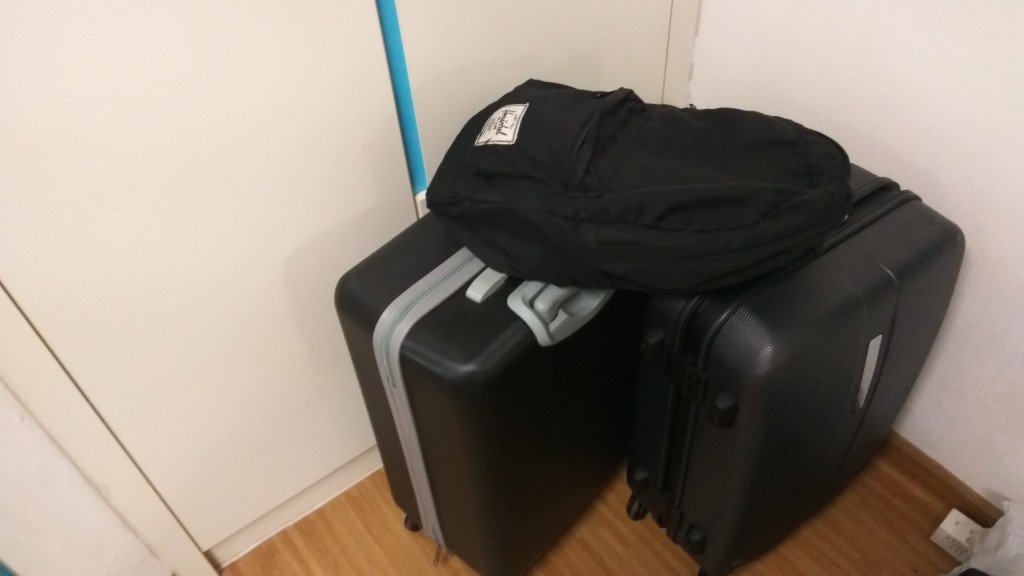2 suitcases, and 1 backpack. Those are what I brought the first day I stepped into Singapore to enter my new phase of life. But now, I can’t event count how much stuff I have sold or thrown out every time I’ve moved from one hostel room to another. At the time I write this article, I’ve just finished moving my stuff into my new room, I sat down and imagined what if the next time I move will only allow me to bring two suitcases filled with my most precious belongings, would it make my life easier? Would my life be simpler if I detach myself from my belongings that I consider as valuable?


If we think about it, we are continuously surrounded by endless options every day and we are living in a society where we are bombarded with the desire to buy more, consume more and have it all. We would never be satisfied with what we have and we felt that we need to have more than what we really need. As time goes by, I realized that I start buying things impulsively rather than buying them for functional value.
If you’re just like me, keep reading on! Sit down, let me help you break down some minimalism tips that we can slowly incorporate to our everyday life. Why would this be relevant to you, diasporas and aspiring diasporas out there? In my opinion, living abroad is the best opportunity to practice the art of minimalism. Even though I may still have plenty of personal belongings with me, I am slowly adapting myself to minimalism, and re-create the life that once I lived. By practicing minimalism, we embrace a mindset that leads us to live a freer live and helps us to feel healthier, happier, and more grateful for what we have.
CLOTHING

I rarely paid attention to what I wear before I came to Singapore. It may have contributed to the fact that at that time, I may not be mature enough to think about how I should dress and represent myself to other people. But as time goes by, my commitments require me to pay more attention to how I look, most of my colleagues really knew how to look dress well, and people here understand that what we wear is a way to express our style and creativity.
But sometimes, we have more than we need. Research shows that we often wear 20% of our wardrobe pieces, 80% of the time. Are you able to count how many pieces of clothing that you have not worn in the past 3 months? How about that cute little sweater from your aunt, or that cheap shirt you got from running half- marathon? Yes, we have a clothing situation and it’s time for an overhaul and goes back to basics.
Two key clothing elements that I highly recommend are the basic pieces and unique accessories. Basic pieces allow you to be able to make at least 20 clothing options by doing simple mix-match. Accessories can take an outfit from 0 to 100 if you do it properly, but don’t go too overboard with this one. Keep that nice watch that your father gave you, for girls, try that unique gold necklace you have on
various occasions. Don’t be afraid to get creative and express yourself with accessories, plus, accessories won’t take up too much space!
LIVING SPACE
In In our houses, apartments, or wherever you live back home, space is mostly filled with things that we’ve had for years but forgot existed, and things that have more emotional value rather than its functional value. Nowadays, every time I moved to a new place, I try to take some time to stop and think what are the things that I truly need to bring with me and how can I make use of the things that I already have and how can I make more of my space with less.
If you have items that have been sitting at your desks for more than 3 months, chances are you will never use them again and it is best for you to
take them out or replace it with items that have more functional value. But this does not mean that you need to throw away all your decorative and artistic pieces, instead, have a few unique, statement pieces in each room at the place you are currently living in. Have a handful of things that pop out and unique, this could instantly grab the attention of any visitors in your place. However, keep in mind that quality is the key, pay attention to the details instead of the quantity.
And lastly, keep your place clean and organized. Organized your belongings into three separate categories: the one that you frequently used, the one that might be useful soon, and the one that you never use in the past couple of months and you need to get rid of. More than anything, one of the keys to living a minimal lifestyle is keeping things organized.
FOOD
Chances are, whenever you are moving to a new place, you’ll have different types of food that are completely different than what you’re used to having at home. You won’t be having your grandma’s soup with all the spices and fragrant ingredients, and all the snacks and comfort food that you can’t live without.
You might ask, why does food has to do with minimalism. Based on my experience, when you’re going to live abroad, you’ll be tempted to bring a huge box filled with heart-warming, homesick curing food as simple as Indomie. My advice to you is that you should only buy what you’re going to eat. I observe many people brought tons of food when they go abroad, they bought multiple packages of the same things, and they ended up expired and wasting up money and refrigerator space.
If you know someone near the place you live that run a decent restaurant or catering, try asking them to cook meal plans for you. Skip the kitchen utensils unless you really want to stretch every penny that you have by cooking. List out what you’ll try to eat during the week, it’ll solidify your meal plans and grocery list, and prevent that random pizza craving that you and your buddy might have during a random movie night.
Bonus!
Apart from Clothing, Living Space, and Food, which are the essential human needs, there are some minimalist concepts that are suggested by Andy Lee Graham that we can live by:
• Debt and monthly payments should be avoided, and try to pay the least amount of money for everything that you are going to buy
• Buy things that are used daily, and do not replace for fashion reasons. Things that lead to higher status should be questioned and avoided.
• Look for the simple answers, don’t overcomplicate things to achieve freedom and contentment









